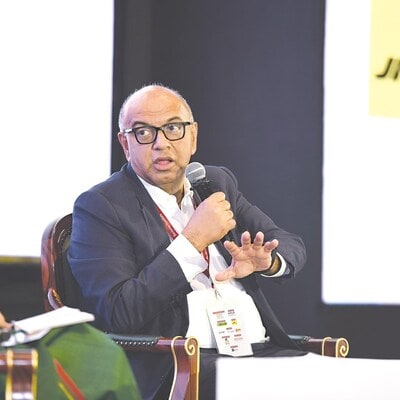BS Manthan: Never had a funding winter, says Sanjeev Bikhchandani
Serial entrepreneur and Info Edge Co-founder Sanjeev Bikhchandani said good companies always had enough money to back them (Photo: Kamlesh Pednekar)
The Indian startup ecosystem never faced a funding winter, said Sanjeev Bikhchandani, serial entrepreneur and co-founder, Info Edge, on Thursday.
“There was never really a funding winter. There was a funding excess… Too much money chasing too few deals at too high valuations. I don’t think enough investors were discerning enough,” he said during a fireside conversation at the Business Standard Manthan event in New Delhi.
The ongoing funding slowdown, he added, imparted some much-needed fiscal discipline to cash burning startups. “Good companies always had enough money to back them. Right now, we are back to reasonable levels of funding,” he said.
Bikhchandani, who had started up himself way back in 1990 with job portal naukri.com years before jobs or lack of jobs had started making headlines, said startups are expected to play a crucial role in making India a developed economy by 2047. According to him, many of the giant companies in 2047 could be startups of today.
“In 1984, if you had asked me what will happen after 40 years, I would not have predicted this. If you ask me now, what will happen 40 years into the future, I don’t know. But change will happen,” Bikhchandani said drawing parallels between his startup journey and the years leading up to 2047.
This change, he added, will be driven by forces such as regulation, technology, capital, entrepreneurship, and talent.
Bikhchandani emphasized the importance of startups working withing the purview of regulations. “Regulations are okay. But the low-level bureaucracy at the state level, that is where the issues are,” he said.
“Before 1991, you could do business without taking many government permissions. Government permissions slow down stuff…Freedom to do business is really important. It is what drives velocity. You get velocity, you get growth,” he said.
Advising budding entrepreneurs, Bikhchandani said that “the customer’s money is better than the investor’s money.”
If startups are able to generate revenue from repeat customers, with this revenue being higher than their expenses, they would be able to generate viable businesses.
“Investors love to invest in companies that are getting money from customers. If you get the investor’s money first, there is no guarantee that the customer’s money will come,” he said.
He advised founders to be frugal, since they do not have control over their revenue. “It is important for you to be frugal early on because you have no control over your revenue. In order to survive, your revenue needs to be more than your costs,” he said.
He added that it is vital for entrepreneurs to dream big, but start small. “It is important to make your mistakes small so the cost of failure is not that big,” he said.
First Published: Mar 29 2024 | 12:17 AM IST
